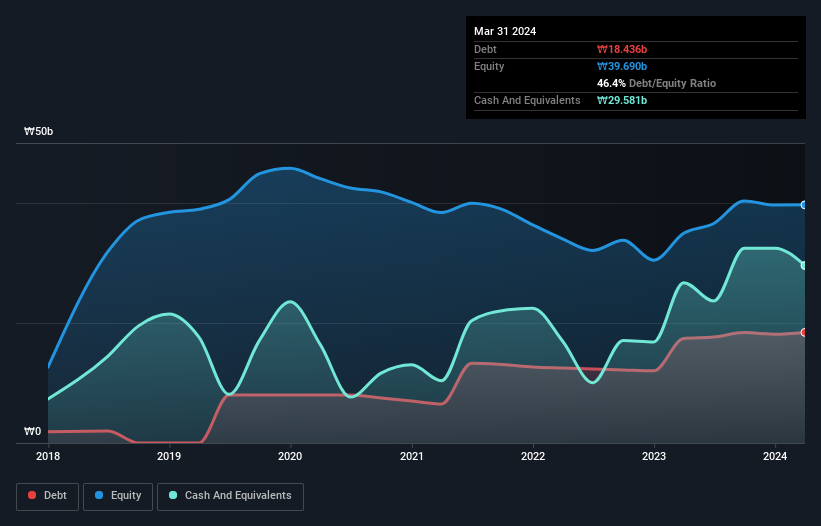Some say volatility, rather than debt, is the best way to think about risk as an investor, but Warren Buffett famously said that 'Volatility is far from synonymous with risk.' So it might be obvious that you need to consider debt, when you think about how risky any given stock is, because too much debt can sink a company. We note that Barrel Co., Ltd (KOSDAQ:267790) does have debt on its balance sheet. But should shareholders be worried about its use of debt?
What Risk Does Debt Bring?
Debt assists a business until the business has trouble paying it off, either with new capital or with free cash flow. If things get really bad, the lenders can take control of the business. However, a more usual (but still expensive) situation is where a company must dilute shareholders at a cheap share price simply to get debt under control. Of course, debt can be an important tool in businesses, particularly capital heavy businesses. The first step when considering a company's debt levels is to consider its cash and debt together.
View our latest analysis for Barrel
What Is Barrel's Net Debt?
The image below, which you can click on for greater detail, shows that at March 2024 Barrel had debt of ₩18.4b, up from ₩17.4b in one year. But on the other hand it also has ₩29.6b in cash, leading to a ₩11.1b net cash position.

A Look At Barrel's Liabilities
We can see from the most recent balance sheet that Barrel had liabilities of ₩8.33b falling due within a year, and liabilities of ₩19.9b due beyond that. Offsetting these obligations, it had cash of ₩29.6b as well as receivables valued at ₩4.19b due within 12 months. So it can boast ₩5.57b more liquid assets than total liabilities.
This short term liquidity is a sign that Barrel could probably pay off its debt with ease, as its balance sheet is far from stretched. Succinctly put, Barrel boasts net cash, so it's fair to say it does not have a heavy debt load!
Notably, Barrel made a loss at the EBIT level, last year, but improved that to positive EBIT of ₩8.9b in the last twelve months. There's no doubt that we learn most about debt from the balance sheet. But you can't view debt in total isolation; since Barrel will need earnings to service that debt. So when considering debt, it's definitely worth looking at the earnings trend. Click here for an interactive snapshot.
But our final consideration is also important, because a company cannot pay debt with paper profits; it needs cold hard cash. Barrel may have net cash on the balance sheet, but it is still interesting to look at how well the business converts its earnings before interest and tax (EBIT) to free cash flow, because that will influence both its need for, and its capacity to manage debt. Over the most recent year, Barrel recorded free cash flow worth 56% of its EBIT, which is around normal, given free cash flow excludes interest and tax. This cold hard cash means it can reduce its debt when it wants to.
Summing Up
While we empathize with investors who find debt concerning, you should keep in mind that Barrel has net cash of ₩11.1b, as well as more liquid assets than liabilities. So we don't have any problem with Barrel's use of debt. When analysing debt levels, the balance sheet is the obvious place to start. But ultimately, every company can contain risks that exist outside of the balance sheet. For instance, we've identified 2 warning signs for Barrel (1 shouldn't be ignored) you should be aware of.
At the end of the day, it's often better to focus on companies that are free from net debt. You can access our special list of such companies (all with a track record of profit growth). It's free.
Valuation is complex, but we're here to simplify it.
Discover if Barrel might be undervalued or overvalued with our detailed analysis, featuring fair value estimates, potential risks, dividends, insider trades, and its financial condition.
Access Free AnalysisHave feedback on this article? Concerned about the content? Get in touch with us directly. Alternatively, email editorial-team (at) simplywallst.com.
This article by Simply Wall St is general in nature. We provide commentary based on historical data and analyst forecasts only using an unbiased methodology and our articles are not intended to be financial advice. It does not constitute a recommendation to buy or sell any stock, and does not take account of your objectives, or your financial situation. We aim to bring you long-term focused analysis driven by fundamental data. Note that our analysis may not factor in the latest price-sensitive company announcements or qualitative material. Simply Wall St has no position in any stocks mentioned.
Have feedback on this article? Concerned about the content? Get in touch with us directly. Alternatively, email editorial-team@simplywallst.com
About KOSDAQ:A267790
Excellent balance sheet and fair value.
Market Insights
Community Narratives




